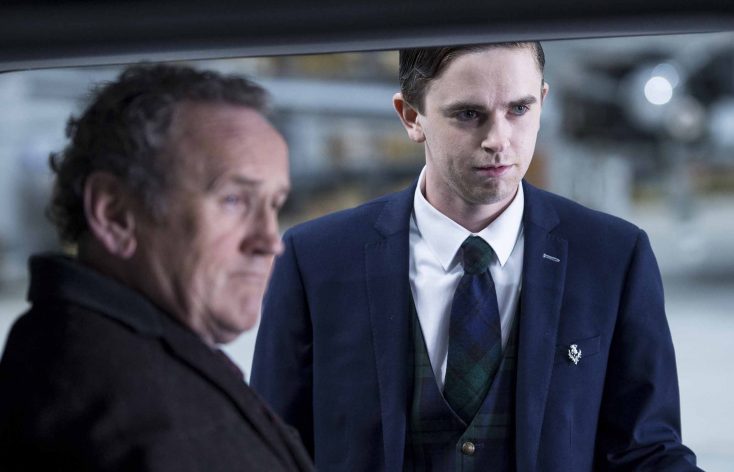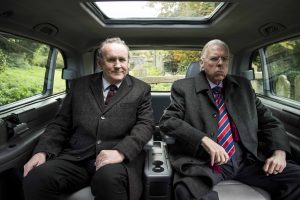By ANGELA DAWSON
Front Row Features
HOLLYWOOD—To his American fans, Colm Meaney will always be Transporter Chief Miles O’Brien of “Star Trek: The Next Generation,” a role he carried over into “Star Trek: Deep Space Nine.” But Meaney, who’s lived in the U.S. for three decades, began life in Dublin, Ireland 64 years ago, not far from where Unionists and the IRA fought for political control of Northern Ireland for decades.
One of the rare deep-rooted and bloody world conflicts that has been defused, Northern Ireland’s decade-old peace agreement is a shining example of what can happen when two polar opposites can achieve when they come together and hammer out an agreement for the benefit of their people. How that agreement came to be is depicted in “The Journey,” written by Colin Bateman and directed by Nick Hamm.
Meaney plays Martin McGuinness, an Irish republican and Sinn Fein leader who has come to St. Andrews in Scotland to work out a deal with Democratic Union Party leader and loyalist Rev. Ian Paisley, played by Timothy Spall (Wormtail in the “Harry Potter” films).
Already reluctant to even speak with a former ranking leader of the Irish Republican Army, whom he regards as a terrorist, the firebrand reverend is eager to leave the proceedings to get back home to celebrate a 50th anniversary party with his wife and family. An approaching thunderstorm forces him to take a car to a distant airport. Supporters of the peace process quickly maneuver to ensure McGuinness is also in the car, and the two sides continue their negotiations, even if it means covertly instructing the limo driver to take them on a circuitous route through the countryside to keep them talking on the way to the airport.
Over the course of the film, Meaney’s McGuinness and Spall’s Paisley go from hostile enemies who won’t even speak (or lend a phone to the other) to airing their longstanding grievances about the other side’s transgressions to working out a cooperative power-structure arrangement that will end the bloodshed, once and for all. With the exception of cuts to negotiation supporters feeding information to the driver, most of the film centers on the verbal sparring between Meaney and Spall, who previously starred in the soccer film “The Damned United,” although they didn’t have scenes together in that 2009 drama.
By phone from New York where he is promoting the political dramedy, Meaney spoke about portraying a politician that he met and once campaigned for in his bid to become Ireland’s president. He reveals he was a bit reluctant initially to tackle the role, but was won over the script and its fun and entertaining take on how the historic agreement was achieved.
Q: How did this project come to you? Why did you want to do it?
Meaney: The script was sent. I had some trepidation because I felt that a film about the peace process and the political process might be a dry, political treatise but I was pleasantly surprised. I thought the characters were beautifully written, the politics were good and I laughed a lot. I laughed out loud while I was reading it, so I immediately wanted to be involved in this.
Q: Timothy Spall wore some prosthetics around his mouth and chin in order to look more like Paisley. You didn’t have to wear any additional makeup or prosthetics.
Meaney: They felt I sort of looked similar enough to Martin that it didn’t warrant (a lot of makeup). Paisley was a very distinctive looking man, with the big teeth and all. Martin wasn’t like that. He was a bit bland like me. (He laughs.)
Q: When you’re portraying a real person, does that present to you a challenge?
Meaney: Absolutely there is. I met Martin once; I supported his campaign for president. When it comes to playing a public figure like this, people know what they look like, what they sound like, so yes, it’s a big challenge. With a fictional character, you start with a blank page and you choose to be a redhead or a blond or whatever. But with a real person, you try to look as much like the character as possible and sound like the character. Otherwise, you’ll alienate people right away. I also considered what he would think of (my performance) and his family—there are a lot of considerations that you have here that you don’t have with a fictional story.
Though I loved the script, I did spend a few weeks thinking, “Can I do this? Am I capable of doing this?” Both Martin McGuinness’ and Ian Paisley’s family were aware we were doing the project and they gave the project their blessing. They didn’t want to interfere in any way or have any control over it. So, that was good to know going into it. It made the decision to do it a little easier.
Q: Have you ever been on a road trip or on a plane next to someone you didn’t really like? How do you handle such situations?
Meaney: Now that you mention it, I have been stuck in a situation like that but I can’t think of specific example. I think my response would be to find something to busy myself like use my phone or read a book. That would be the way I’d try to disengage, as it were.
Q: Towards the end of the film, Martin says to Paisley, “The world will applaud us, but our people will hate us.” Is that what leadership is about? Sometimes you have to do the unpopular thing for the greater good?
Meaney: Very much so. The phrase, over the course of the film, that comes to my mind a lot for some reason is, “You don’t need to talk to your friends; you need to talk to your enemies.” The position that’s frequently taken by so-called leaders is, “We don’t negotiate with terrorists,” or “We don’t negotiate with these people.’ They’re the very people you have to negotiate with in order to achieve anything. This is what McGuinness was getting at here. I think that is very much leadership; it’s courageous leadership to say to your people, “Look, we can’t just keep saying ‘no.’ We can’t just keep pursuing the same failed policy. We have to change. We have to reach out. We have to try and understand their position. That’s a big risk as far as your own supporters are concerned. They can turn on you very quickly and if you don’t have their support, you have nothing. So, I think it’s a very pertinent and a very accurate statement in terms of what exactly is leadership.
Q: Martin seems more conciliatory throughout than the reverend. Was he more of a diplomat or did he simply have more to gain from reaching this agreement?
Meaney: I think he was more of a diplomat. They both had a huge amount to gain. From the beginning, from the mid-‘90s when Sinn Fein (the left-wing Irish republican political party) changed and became part of the solution rather than part of the problem, from that moment on, they were very eager to engage in a process. Whereas the DUP, Paisley’s party, was basically saying, “No.” People have made the comment that Sinn Fein were in the peace process because they wanted to be and the DUP were in the process because they had to be. The big change happened in 1997 when (former British Prime Minister) Tony Blair was elected, he told (the Conservatives), “You can’t keep saying ‘No.’ You’ve got to engage.” That was a big change, and it moved the process forward. In a way, McGuinness was leading that and you can see that reflected in the beginning of the film where you see that he’s the one who wants it. He’s the one who wants to talk and Dr. Paisley doesn’t.
Q: You and Timothy Spall spent a lot of time in the backseat of the limo. What did you talk about during your down time?
Meaney: We’re both avid readers and read newspapers. We’re interested in current affairs and politics. Yeah, we’d have long chats about things.
Q: Did you always agree? Or were there disagreements?
Meaney: We’re surprisingly close. Tim’s more of a centrist, and I’m more to the left. Tim is a very deep thinker and a smart man. It’s a pleasure to be in his company. There was never any tension between us. We also respected each other’s positions. We agreed to differ, occasionally.
Q: What are you working on next?
Meaney: I just started rehearsals in London for a production of “Cat on a Hot Tin Roof” on the West End, with Sienna Miller and Jack O’Connell. We open that in mid-July. I’ve got to come back to New York next weekend for the launch of a new series I’m doing for TNT called “Will,” about William Shakespeare. They’ll be rolling that out next month. We have the premiere here in New York. When I finish in London in October with the theater, I’ll go straight back to (set on) “Will.” That’s my year kind of mapped out.
“The Journey” is in limited release in theaters.






